




- BRNN
- BRI News
- BRNN News
- Database
Official Documents Polices and Regulations
Inter-government Documents International Cooperation BRI Countries
Business Guide Economic Data BRI Data
Trade
Investment Projects Latest projects
Cases - Content Pool
In the first seven months of 2024, the monthly shipment volume via China-Vietnam freight trains departing from south China's Guangxi Zhuang Autonomous Region shattered records three times, marking a significant milestone in the region's cross-border trade.
In March, over 500 twenty-foot equivalent unit (TEU) containers of goods were shipped. The figure more than tripled in April, reaching 1,622 containers, before soaring to an impressive 1,922 TEUs in July.
"The China-Vietnam freight train service is efficient and convenient. It saves us three to five days compared to sea transport, helping us better tap into the markets of Association of Southeast Asian Nations (ASEAN) countries," said Zhu Shiqiang, business manager at Sinotrans Guangxi Co., Ltd., which recently exported high quantities of goods to Vietnam.
This success story is the result of Guangxi's unwavering commitment to opening up to domestic and international markets and creating a convenient market for domestic and international dual circulation. The autonomous region has promoted an ocean-oriented economy and enhanced connectivity with ASEAN countries and the Guangdong-Hong Kong-Macao Greater Bay Area.
The improvements in logistics are of particular value to the fresh produce industry.
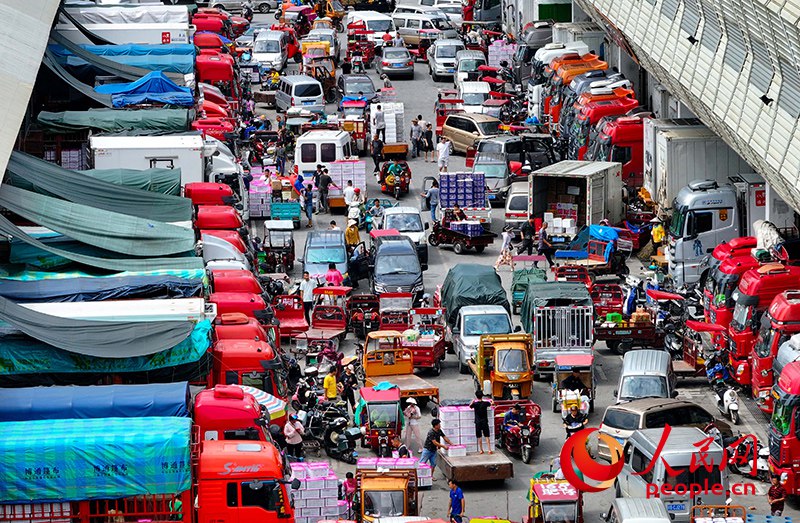
Photo shows a bustling scene of the Haijixing Agricultural Products International Logistics Center in Nanning, capital city of south China's Guangxi Zhuang Autonomous Region. (People's Daily Online/Lei Qijun)
At the Haijixing Agricultural Products International Logistics Center in Nanning, capital city of Guangxi, the buzz of activity is palpable. Tan Jiafu, a young wholesaler from south China's Guangdong Province, meticulously checks orders at the center. During peak seasons, he sells 100 tonnes of imported durian a day to places across the country.
"It takes just four to five days at most for durians from orchards in Thailand to be transported to fruit wholesale markets in Guangxi," Tan said, highlighting the efficiency that drew him to engage in import activities in Guangxi.
Fresh durians have a shorter shelf life and require efficient customs clearance. The Youyiguan Port, nestled on the China-Vietnam border, stands as the largest gateway for foreign fruits into Guangxi. Leveraging the port's advantages, the Chongzuo area of the China (Guangxi) Pilot Free Trade Zone (FTZ) has joined forces with Nanning Customs to implement an innovative model for imported fruits, significantly boosting both inspection and customs clearance efficiency.
A truck laden with ASEAN fruits passes through customs clearance in just 15 seconds thanks to streamlined procedures at the Youyiguan Port. In the first seven months of this year, fruit imports through the port reached a staggering 465,000 tonnes. The imports in total were worth 11.72 billion yuan ($1.65 billion), accounting for over 80 percent of all imported fruits going through Guangxi ports.
This efficient connectivity forms the bedrock of Guangxi's strategy to create a convenient market for domestic and international dual circulation. The autonomous region has given full play to its geographical advantages to contribute to the high-level construction of the New International Land-Sea Trade Corridor, an international trade and logistics passage jointly built by Chinese provincial regions and ASEAN countries, while making more efforts to serve and integrate into the new development paradigm.
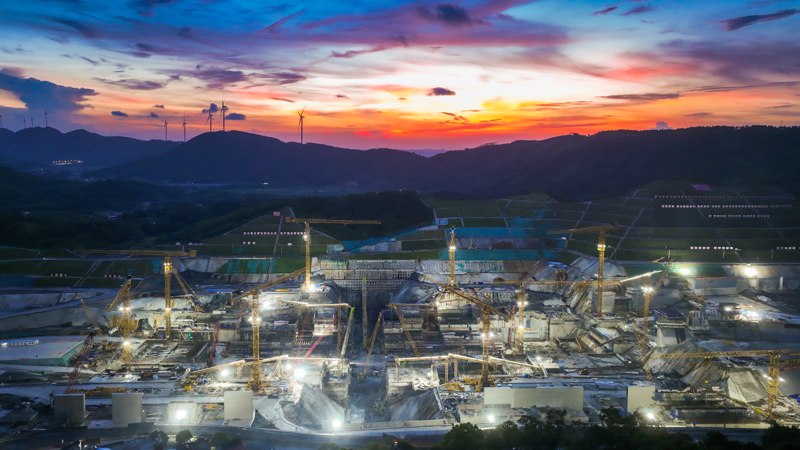
Photo shows a construction site of the Pinglu Canal in south China's Guangxi Zhuang Autonomous Region. (Photo courtesy of Pinglu Canal Group)
As a flagship project on the New International Land-Sea Trade Corridor, the 134.2-kilometer Pinglu Canal in Guangxi will become the shortest and the most convenient route to the sea for regions in southwest China upon completion.
In the manufacturing sector, Guangxi is pushing the envelope of innovation.
The "smart island" factory, based on lean and modular manufacturing, of SAIC-GM-Wuling (SGMW) in Guangxi has slashed the time needed to build a traditional car production line from two years to just one month.
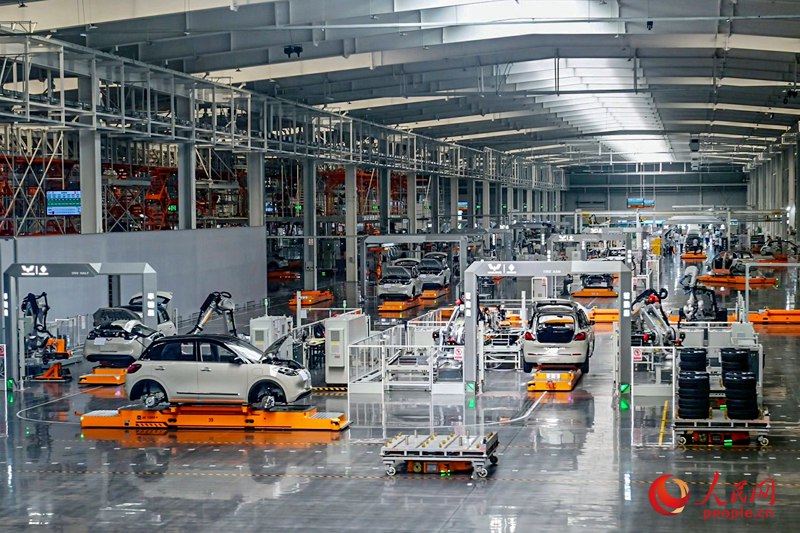
Photo shows a "smart island" factory at SAIC-GM-Wuling (SGMW) in south China's Guangxi Zhuang Autonomous Region. (People's Daily Online/Lei Qijun)
Vehicles produced in Guangxi have been exported to Southeast Asia, Europe, America, and Africa. In early August, a complete automobile production line by Dongfeng Liuzhou Motor Co., Ltd. was exported from Liuzhou city to Cambodia. Since the beginning of this year, the company has received a multitude of inquiries from clients overseas, seeking assistance in establishing complete vehicle production lines for local assembly.
Guangxi's geographical proximity to ASEAN countries has made it an attractive investment destination for many ASEAN enterprises looking to enter the Chinese market, including Guangxi Taijingxi Taizhong Trading Co., Ltd.
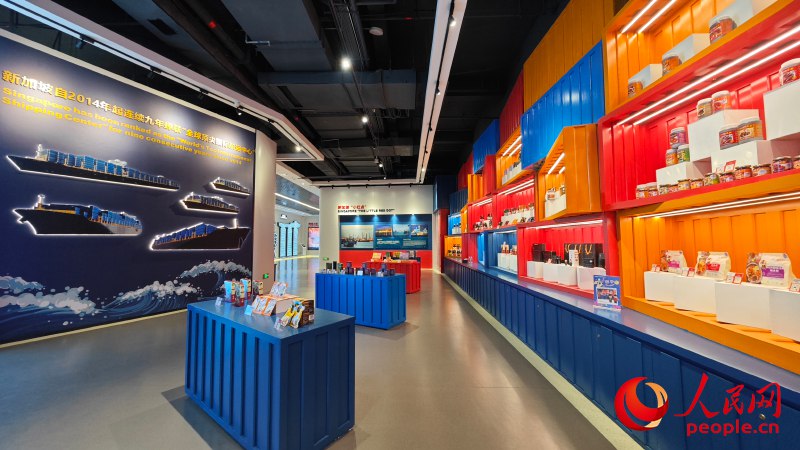
Photo shows a view of the China-ASEAN Mercantile Exchange in Nanning, capital city of south China's Guangxi Zhuang Autonomous Region. (People's Daily Online/Yan Lizheng)
After joining the China-ASEAN Mercantile Exchange, which was established less than three years ago by the China-Singapore Nanning International Logistics Park and the China-ASEAN Expo Secretariat, and serves as a B2B and B2C platform for trade between China and ASEAN countries, the company has seen its sales grow year after year.
Work done to improve Guangxi's overall business environment has also been a major boon for the region.
"Guangxi has been doing its best to foster a market-oriented, world-class business environment within a sound legal framework. This has strengthened our resolve to invest in Guangxi," said Metinee Nuntadee, general manager for the Thai market at the company.
A 2023 survey on business environment conducted by the All-China Federation of Industry and Commerce, which covered 10,000 private enterprises, showed Guangxi as one of the five provincial-level regions with the most noticeable improvements in its business climate. Behind this success lies Guangxi's bold approach to development through its pilot FTZ.
The China (Guangxi) Pilot FTZ has attracted over 100,000 enterprises, marking a 28-fold increase prior to its inception five years ago. The FTZ has implemented all 120 pilot projects assigned by the country, and has replicated and promoted 169 region-level innovations across the region.
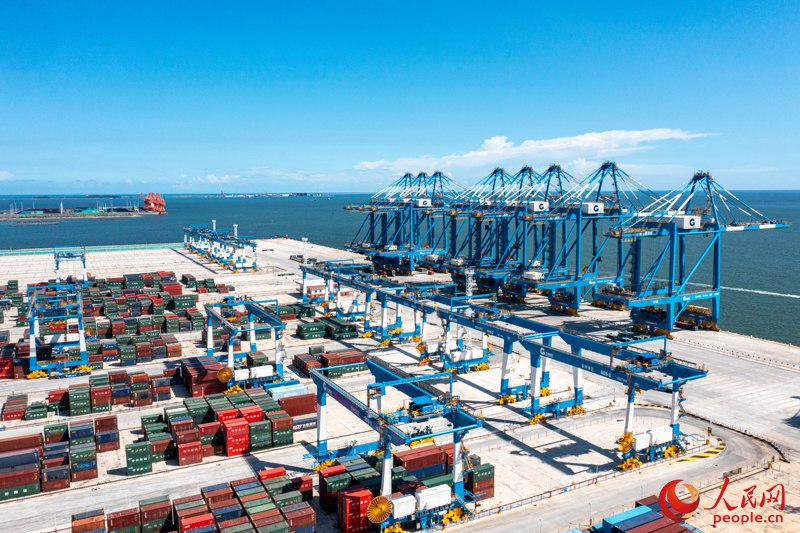
Photo shows an automated container terminal at Qinzhou port area of the Beibu Gulf Port, south China's Guangxi Zhuang Autonomous Region. (People's Daily Online/Yan Lizheng)

Tel:86-10-65368972, 86-10-65369967